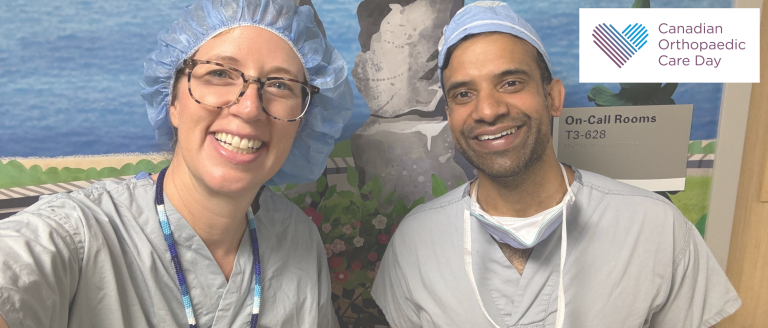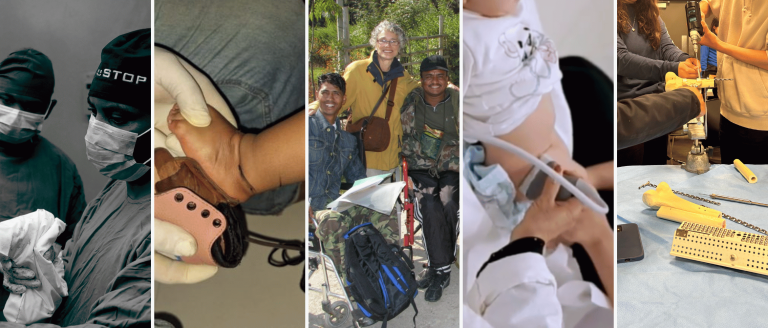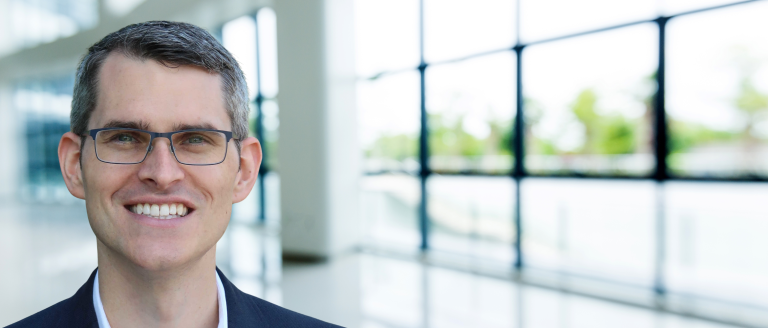Our UBC GO Team




Written by Clara Joo
About UBC Global Orthopaedics (UBC GO)
For over 40 years, UBC’s Department of Orthopaedics has been at the forefront of advancing musculoskeletal care, education, and research. Building on this strong foundation, UBC Global Orthopaedics (UBC GO) was established to expand UBC’s impact beyond Canada, addressing the urgent need for orthopaedic care and training in resource-limited settings.
On March 26, 2025, we celebrate Canadian Orthopaedic Care Day. This year’s theme, ‘Bridging Generations in Orthopaedic Care,’ emphasizes the importance of mentorship between senior and early-career surgeons. UBC GO initiatives foster mentorship between experienced faculty and the next generation of orthopaedic surgeons, nurses, and allied health professionals to strengthen global musculoskeletal health.
Through collaboration, research, and sustainable healthcare initiatives, UBC GO is empowering healthcare professionals and communities worldwide to improve patient outcomes. Through extending our global reach, we are bringing home invaluable insights to Canada, driving improvements in our local healthcare systems.
How We Started
UBC Global Orthopaedics (UBC GO) builds upon 25 years of global engagement by UBC faculty, students, and partners dedicated to improving orthopaedic care worldwide.
The first global orthopaedics initiative led by UBC faculty began in 1999 with Dr. Shafique Pirani’s work in Uganda, marking the beginning of a long-standing commitment to global health. Recognizing the need for a more structured and sustainable approach, UBC GO was established under the UBC Faculty of Medicine’s Department of Orthopaedics to unite these efforts under one umbrella.
The foundation for UBC GO was laid by pioneering groups such as the Uganda Sustainable Clubfoot Care Project (USCCP), the Sustainable Clubfoot Care in Bangladesh (SCCB), and the Uganda Sustainable Trauma Orthopaedic Program (USTOP), which were initiated in collaboration with key global partners. These early initiatives provided a model for how UBC could contribute to global orthopaedics in a meaningful, coordinated way.
For decades, UBC faculty members have been actively engaged in global health initiatives in Uganda, Nepal, Bangladesh, and beyond.

Recognizing the significant impact of these individual faculty-led efforts, Kishore Mulpuri, Head of the Department of Orthopaedics since 2021, sought to strengthen and support these initiatives under a unified framework. UBC GO was formally established in 2024 under the leadership of Kishore Mulpuri to provide institutional support for these international initiatives. Dr. Jeff Potter became the first director of UBC GO, helping to shape and guide the program’s early development. UBC GO was developed as a departmental umbrella to enhance collaboration, provide institutional backing, and ensure the long-term growth and sustainability of global orthopaedic initiatives at UBC.
UBC GO Pioneers
UBC GO emerged from the innovative foresight of several faculty members, whose leadership was instrumental in advancing global orthopaedics initiatives. Visionaries like Drs. Shafique Pirani, Peter Wing, Claire Weeks, Peter O’Brien, Norgrove Penny, Piotr Blachut, and Nelson Greidanus paved the way for a transformative approach to orthopaedics that impacts practitioners and patients worldwide.

Key Early Initiatives
Three key earlier initiates were in Uganda and Bangladesh. The funding for some programs, such as USCCP and SCCB, came from the Canadian government, which provided financial support to UBC. UBC then allocated these funds directly to Uganda and Bangladesh to implement and sustain these initiatives.

Uganda Sustainable Clubfoot Care Project (USCCP)
Launched in 2005, this initiative partnered with Makerere University and the Ugandan Ministry of Health to provide sustainable care for congenital clubfoot deformities, improving long-term treatment outcomes. Between 2005 and 2012, USCCP received $1.8 million in funding.

Uganda Sustainable Trauma Orthopaedic Program (USTOP)
Established in 2007, USTOP focused on improving trauma orthopaedic care at Mulago Hospital through education and training for local healthcare providers. USTOP continues to be a key global orthopaedics initiative today.

Sustainable Clubfoot Care in Bangladesh (SCCB)
Running from 2012 to 2017, SCCB had a total budget of $5.79 million and built long-term capacity for clubfoot treatment in Bangladesh.
Where We Are Now
Global Reach
Our first UBC GO Coordinator, Tarini Boparai, conducted a survey that identified 47 different initiatives spanning over 12 countries in which BC faculty have contributed to global orthopaedics. To explore these projects further, view our map of UBC GO initiatives.
Today, UBC GO initiatives focus on education, capacity-building, and sustainable healthcare solutions in low-resource settings, with a strong emphasis on training the next generation of orthopaedic surgeons, residents, nurses, and physiotherapists. In Uganda, for example, faculty members are deeply engaged in mentorship and skill development for healthcare professionals, ensuring that local providers are equipped with the knowledge and tools necessary to deliver high-quality, sustainable care.

Current Initiatives
We are actively engaged in four global initiatives.

Uganda Sustainable Trauma Orthopaedic Program (USTOP)
Led by Dr. Jeff Potter, USTOP continues to improve trauma care at Mulago Hospital through skill-building workshops and sustainable education initiatives for Ugandan medical residents, nurses, and physiotherapists. Learn more

Ponseti Clubfoot Navigator (PCN)
Led by Dr. Shafique Pirani, PCN is a digital clinical decision support tool developed in collaboration with global experts, ensuring standardized diagnosis and treatment of clubfoot worldwide. Every week, we meet with clubfoot experts from around the world (Bangladesh, Belgium, Chile, Germany, Holland, India, Rwanda, Tanzania, United Kingdom, and more) over Zoom. Learn more

Spinal Cord Injury Nepal (SpiNepal)
Led by Drs. Peter Wing and Claire Weeks, SpiNepal works with Nepalese healthcare providers to enhance spinal cord injury care at the Spinal Injury Rehabilitation Centre (SIRC). Learn more

The Hip Hope Network
Led by Drs. Kishore Mulpuri and Emily Schaeffer, Hip Hope is a collaboration of hip health professionals focused on global research to improve care for children with hip conditions. Learn more
Global-to-Local: Applying Global Lessons to Local Care
UBC GO not only supports global outreach but also brings valuable insights back to Canada to improve local healthcare systems. Through these international collaborations, faculty and trainees learn innovative surgical techniques, healthcare delivery models, and resource-efficient solutions that can be adapted to rural and Indigenous communities in British Columbia.
Many team members return from global outreach trips with new perspectives on patient care, medical education, and sustainability in healthcare. Their experiences working in resource-limited settings shape how they approach clinical practice, mentorship, and systemic change within Canada.
“Operating in a low-resource setting exposed me to older surgical techniques, which has improved my skills.”
— Orthopaedic Resident from USTOP 2024 Team
“Being pushed out of my comfort zone makes me better—working in Uganda reminded me why I became a surgeon and humbled me.”
— Orthopaedic Surgeon from USTOP 2024 Team
UBC GO applies these lessons in three ways:
- Strengthening mentorship programs to train future orthopaedic professionals through initiatives like Academic Half-Day, where faculty share global insights with orthopaedic residents.
- Exploring how global innovations can improve rural and Indigenous health equity in Canada.
- Collaborating with national and international partners to develop best practices for orthopaedic care that are context-specific and sustainable.
Supporting Indigenous and Rural Health Needs
UBC GO is also dedicated to addressing inequalities in access to healthcare experienced by rural and indigenous communities in British Columbia. We have begun work on this commitment by partnering with the Seed2STEM program.

This program plays a significant role in engaging Indigenous youth, providing them with the knowledge and inspiration to pursue careers in healthcare. UBC GO was able to provide orthopedic trauma education and mentorship in the hopes of inspiring the next generation of Indigenous health science leaders.
UBC GO has also embraced its responsibility to address systemic racism in healthcare. The In Plain Sight report, which highlights the barriers Indigenous peoples face in accessing healthcare, serves as a crucial resource for faculty members.
UBC GO encourages faculty to complete the San’yas Anti-Racism Indigenous Cultural Safety Training Program, which helps foster cultural competency and promotes inclusive healthcare environments for Indigenous populations.
In partnership with the Rural Coordination Centre of BC (RCCBC), UBC GO is working on a program to improve healthcare access for Indigenous communities through Real-Time Virtual Support (RTVS). This initiative uses virtual apps to provide healthcare support to remote communities, ensuring that essential orthopaedic care is more accessible.
Where We Are Going
UBC GO is committed to expanding its impact both globally and locally in three key areas:
- Building Global Presence – Expanding outreach efforts in lower- and middle-income countries (LMICs) while addressing health disparities within Canada, particularly in Indigenous and rural communities.
- Fostering Research and Education – Increasing the volume of high-quality research in the field of global orthopaedics and improving education programs for healthcare practitioners. UBC GO prioritizes evidence-based research that drives impact and measures the outcomes of its initiatives.
- Expanding Impact – Supporting faculty and trainees to build orthopaedic care capacity in LMICs through international exchanges, collaborative research, and the development of new programs to address key orthopaedic challenges.
UBC GO’s mission remains clear: to advance health outcomes globally by supporting initiatives that build capacity in LMICs and address health disparities in Canada. This includes inspiring and educating future generations of medical students and orthopaedic residents about the importance of global health and orthopaedics in underserved regions.
A Thought for the Future
“UBC GO aims to enable faculty, students, and researchers in the Department of Orthopaedics to have an ever-increasing presence and impact on global orthopaedics, thereby improving the lives of those affected in lower- and middle-income countries by ways and means that are economically and socially feasible for their societies.”
— Dr. Shafique Pirani
Learn More
To learn more about UBC GO and its global impact, watch our 5-minute video, UBC Global Orthopaedics: Making an International Impact, created by our current and previous coordinators (Clara Joo, Churan Chang, Maneeta Janjua). The video highlights our ongoing projects and how you can get involved.


